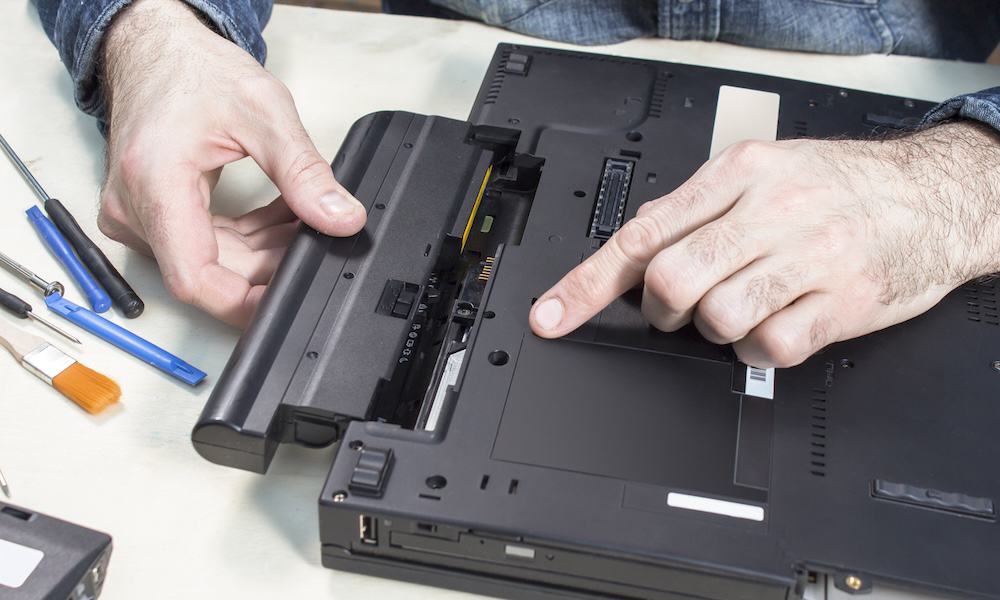Using a laptop without a battery is possible. But is it safe?
The answer depends on several factors. Laptops are designed to work with a battery, but sometimes, you might need to use one without it. Maybe your battery is faulty, or you want to preserve its life. Using a laptop without a battery can be safe in many cases.
But, it comes with risks. You need to understand these risks to make an informed choice. This article will guide you through the safety concerns and help you decide if running your laptop without a battery is right for you. Stay with us to learn more about this important topic.

Credit: www.groovypost.com
Using Laptop Without Battery
Many people wonder if they can use their laptops without a battery. This concern often arises when the battery fails or needs replacement. Running a laptop without a battery can be a practical solution in several scenarios. Let’s explore these situations and hear from users who have tried it.
Possible Scenarios
One common scenario is a dead or damaged battery. In this case, removing the battery can prevent further damage and allow the laptop to function smoothly. Another reason might be to preserve battery life. Some users remove the battery when using the laptop for long hours plugged in.
Another situation might be the desire to reduce heat. Batteries can generate extra heat, which can affect performance. Removing it can keep the laptop cooler. Additionally, if you work in a stationary setup, using the laptop as a desktop can be beneficial.
User Experiences
Many users have shared positive experiences using laptops without batteries. They report stable performance and no significant issues. Some noticed improved cooling and less fan noise. Others appreciate the extended life of their batteries by using this method.
However, some users mentioned downsides. Without a battery, any power interruption can cause data loss. Some laptops may also perform differently, as the battery sometimes aids in power regulation. It’s essential to weigh these pros and cons before deciding.
Potential Risks
Using a laptop without its battery might seem convenient, especially if you’re working in a fixed location. However, it comes with several risks that could affect your device’s longevity and performance. Let’s take a closer look at the potential dangers.
Power Outages
One significant risk is power outages. If you’re using your laptop plugged directly into a power source without a battery, any sudden power loss can shut down your system immediately. Imagine working on an important document only to lose all your progress because of a brief power cut.
These unexpected shutdowns can also lead to data corruption. Your files might not save correctly, causing you to lose critical information. Think about the frustration of having to redo hours of work.
Hardware Damage
Another concern is hardware damage. Laptops are designed to run with a battery that provides a stable power flow. Without it, any power fluctuations can directly affect the internal components. This might not be noticeable immediately, but over time, it can cause significant wear and tear.
Power surges can be particularly harmful. They can damage your laptop’s motherboard, rendering the device useless. Repairing or replacing these parts can be costly, so you’re better off using the battery as a buffer.
Have you ever used your laptop without the battery? Did you face any issues? Share your experiences in the comments below!
Performance Impact
Using a laptop without a battery can significantly impact its performance. This choice can influence system stability, power management, and overall efficiency. Let’s explore how running a laptop on AC power alone might affect your experience.
System Stability
System stability is crucial for any laptop user. Without a battery, your laptop relies entirely on the AC power supply. This can lead to sudden shutdowns if there’s a power interruption.
Imagine working on an important project, and the power flickers. Your laptop shuts down abruptly, risking data loss and file corruption. A battery acts as a buffer, providing backup power during such interruptions.
Moreover, power surges can damage your laptop’s internal components. The battery typically absorbs these surges, protecting your hardware. Without it, you might face more frequent hardware issues.
Performance Variations
Performance variations are another key concern. Some laptops are designed to throttle performance when running on AC power alone. This can result in slower processing speeds and reduced efficiency.
For instance, you might notice your laptop running hotter and louder. The cooling system works harder to maintain optimal temperatures, affecting your laptop’s longevity. You might find it harder to multitask efficiently without the battery’s support.
Additionally, power plans might not function as intended. Many laptops adjust performance settings based on battery usage to conserve energy. Without a battery, these settings might not optimize properly, leading to inconsistent performance.
Have you ever wondered how this affects your daily tasks? Think about streaming videos or playing games—activities that demand steady power. Without a battery, your experience might be less smooth, with frequent lags and interruptions.
In conclusion, while using a laptop without a battery is possible, it’s essential to understand the trade-offs. Considering system stability and performance variations can help you make an informed decision. Would you risk stability and performance for convenience?

Credit: www.reddit.com
Safety Concerns
Using a laptop without a battery can be safe if plugged into a reliable power source. Sudden power loss might cause data corruption or hardware damage. Ensure a stable power supply to prevent issues.
When using a laptop without a battery, you might wonder about the potential safety concerns. These concerns are real, and they can affect both your device and your personal safety. Let’s break down the main safety issues you should be aware of.Electrical Surges
Using a laptop without a battery can expose it to electrical surges. The battery often acts as a buffer, absorbing sudden spikes in power. Without it, your laptop is more vulnerable. Imagine you’re working on an important project, and there’s a sudden power surge. Your laptop could get damaged, and you might lose unsaved work. Investing in a good surge protector can help, but it’s not a foolproof solution. Do you really want to risk your device’s health for the sake of using it without a battery? Consider the potential cost of repairs or even replacing the laptop.Fire Hazards
Another critical safety concern is the risk of fire hazards. Laptops are designed to dissipate heat efficiently, but removing the battery can disrupt this balance. Excessive heat can build up, especially if you’re using your laptop on a soft surface like a bed or couch. Without the battery, the internal components might overheat more quickly. Have you ever felt your laptop getting unusually hot? That’s a warning sign. Using it without a battery could make this issue worse, increasing the risk of a fire. To stay safe, always ensure good ventilation and avoid using your laptop on soft surfaces. But remember, the safest option is to use it with a battery. — By understanding these safety concerns, you can make an informed decision about using your laptop without a battery. Is it really worth the risk?Preventive Measures
Using a laptop without a battery can be safe if you take preventive measures. These steps will ensure your device runs smoothly and efficiently. Pay attention to power surges and regular maintenance to protect your laptop.
Power Surge Protectors
Always use a power surge protector. It shields your laptop from unexpected power spikes. These surges can damage internal components. Surge protectors are affordable and easy to use. Just plug your laptop into the protector. This simple step can save you from costly repairs.
Choose a surge protector with a high joule rating. This rating indicates its energy absorption capacity. The higher the rating, the better the protection. Look for protectors with built-in circuit breakers. These features offer extra safety during power fluctuations.
Regular Maintenance
Regular maintenance is essential for a battery-less laptop. Keep your device clean and dust-free. Dust can clog vents and cause overheating. Use compressed air to blow out dust from vents and fans. Ensure proper ventilation to avoid overheating issues.
Update your laptop’s software regularly. Software updates often include security patches and performance improvements. Running the latest version ensures your laptop stays efficient and secure. Regularly check for updates and install them promptly.
Monitor your laptop’s performance. Look for signs of hardware issues or slowdowns. Address these issues early to prevent bigger problems. Regular maintenance keeps your laptop running smoothly without a battery.

Credit: www.youtube.com
Alternative Solutions
Using a laptop without a battery can be a practical solution for many. However, it comes with its own set of challenges. To address these, let’s explore some alternative solutions that can keep your laptop running efficiently.
Battery Replacement
Replacing the battery is the most straightforward solution. If your laptop battery no longer holds a charge, consider purchasing a new one.
Make sure you buy a genuine battery from a reputable source. This ensures compatibility and safety.
Check your laptop model and specifications before making a purchase. You don’t want to end up with an incompatible battery.
External Power Sources
If replacing the battery isn’t an option, using an external power source can be a viable alternative. Connecting your laptop directly to a power outlet can keep it running.
Ensure your power adapter is in good condition. A faulty adapter can damage your laptop.
Consider investing in a high-quality surge protector. It will safeguard your laptop from unexpected power surges.
Have you ever relied solely on external power for your laptop? It can be convenient but has its limitations.
For instance, you lose portability. Your laptop becomes stationary, tied to a power outlet.
However, it can be a temporary fix while you decide on a more permanent solution.
Do you think you can manage without a battery indefinitely? Or is it worth investing in a new one?
Weigh your options carefully. Each solution has its pros and cons.
Ultimately, the choice depends on your specific needs and circumstances. Whether it’s battery replacement or using external power sources, make an informed decision.
Frequently Asked Questions
Can I Use My Laptop Without The Battery?
Yes, you can use your laptop without the battery. Just connect it to a power outlet.
What Are The Side Effects Of Using Laptop Without Battery?
Using a laptop without a battery can cause sudden shutdowns during power interruptions. It might lead to potential data loss.
Can You Still Use A Laptop With A Dead Battery?
Yes, you can use a laptop with a dead battery. Plug it into a power source for uninterrupted use.
Is It Bad To Let Your Laptop Run Out Of Battery?
Yes, frequently letting your laptop run out of battery can harm its battery life. Keep it charged for optimal performance.
Conclusion
Using a laptop without a battery can be safe. Ensure a reliable power source. Power interruptions may cause data loss. Consider surge protectors for added safety. Regularly save your work. Check your laptop’s compatibility with this setup. Always follow manufacturer guidelines.
Proper care extends your laptop’s lifespan. Evaluate your needs before removing the battery. This approach suits stationary use. Stay informed about potential risks. Your laptop can function well without a battery.
